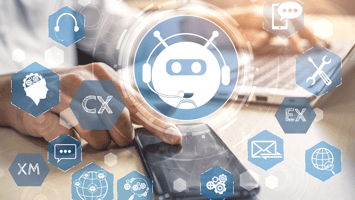If you are reading this, it is likely that you work every day to improve customer experiences for...
How can AI Impact Customer Experience?
AI is going to be Time’s Person of the Year. You heard it here first.
No, I don’t have an inside track - but you can’t deny the explosive impact that AI is having on society right now. Artificial intelligence is creating art, writing code, crafting blog posts, writing whole books, and more. Not a day goes by that I don’t see more articles and social posts about the latest thing someone discovered that ChatGPT can do.
There also isn’t a day that goes by where I don’t see criticism. Creativity is dead. AI is stealing copyrighted materials. So long innovation. “I, for one, welcome our new overlords.”
The question today is, can AI help improve your customer experience, and how?
To be clear, AI isn’t personalization, automation, or other examples of machines helping with tasks by doing exactly what you tell them to do. AI systems can learn from their environment, modify their behavior based on new data, and even develop new strategies for problem-solving.
What is the Proper Role of AI in Customer Experience?
This is more than “what others bought with this product” suggestions or your Echo Show suggesting bean soup recipes after it hears you asking your wife if we should have bean soup for dinner (speaking from experience here). This is continuously learning and predicting customer needs and wants. It is giving employees better tools to deliver better experiences.
Examples include:
- AI can help create personalized customer experiences by using predictive analytics to anticipate customer needs and suggest tailored solutions
- AI can quickly analyze customer feedback and data to identify key areas of improvement and optimize customer experience
- AI can be used to automate customer service interactions and provide quick, accurate responses to customer inquiries
- AI-powered chatbots and virtual assistants can help customers find what they need faster and provide immediate assistance
- AI-driven analytics can be used to identify customer trends and behaviors, allowing businesses to better understand and serve their customer base
In a 2022 article in Harvard Business Review (HBR), the authors explore, “how cutting-edge companies use what they call intelligent experience engines to assemble high-quality customer experiences. Although building one can be time-consuming, expensive, and technologically complex, the result allows companies to deliver personalization at a scale that could only have been imagined a decade ago.” It is a great read on how companies, large and small, are leveraging AI with impressive returns on their investments.
Why use AI to improve Customer Experience?
Businesses and organizations are increasing profitability and boosting their brand’s reputation through improved customer sentiments by utilizing AI technologies.
In the HBR article, the authors report that Brinks realized dramatic increases in revenue with the help of AI. “During the first half of 2021 its average direct-to-consumer (DTC) package size increased from $489 to $968. DTC revenue per user increased from an average of $42.24 to $45.95 during the same period. Overall revenue increased 9.5% compared with the same period in 2020.”
The gains aren’t limited to businesses. Charities are boosting their impact with the help of AI. The United Nations Children Fund USA utilized AI to tailor donor experiences through a system that dynamically suggests an optimal ask to potential donors. They saw a 300% increase in monthly donors, a 71% increase in online donations, and a 38% increase in one-time gift amounts.
While revenue is key, customer sentiment drives revenue. TechTarget looks at how personalization through AI helps, outlining 5 benefits:
- Helps marketers understand customers
- Lets brands stand out
- Enables higher conversion rates
- Creates higher brand loyalty
- Builds trust
- Lest you think this is limited to large corporations with deep pockets, HBR also dove into examples of smaller companies outpacing larger competitors. They point to sweetgreen as one example. With just 140 stores, they implemented a digital experience for customers that resulted in 68% of sales coming from digital, compared to 52% for Starbucks, often considered the gold standard for retail digital experiences.
Is AI going to negatively affect employees?
Employees are the foundation of happy customers and long-term businesses. Happy employees = happy customers.
So, it is a valid question - will utilizing AI decrease employee satisfaction? Are employees worried that AI is going to replace them? Will it help them do their job or cause frustration? Will work and customer experiences feel less human?
The Qualtrics XM Institute report, 2023 Employee Experience Trends, reminds us, “Leaders, the future of work is here, and as we venture into 2023, what’s driving the transformations and innovations in employee experience is the desire to make business more human - and to establish deeper, more meaningful connections through the work we do.”
What’s driving the transformations and innovations in employee experience is the desire to make business more human.
Looking back a few decades, one anecdote I recall from business school in the early 1990s is my information systems professor recalling working at a large corporation as spreadsheets were coming onto the scene. One of the bookkeepers swore by her 10-key machine and didn’t trust these new machines, so she would recalculate the numbers she was in charge of to make sure the computer got it right. My professor said he always wanted to ask her, “How do you know your calculator is working right?”
There is always resistance to change, but in the end, history has shown that technology helps us complete repeatable tasks so we can focus on creativity and innovation.
Technology helps us complete repeatable tasks so we can focus on creativity and innovation.
Implemented well, AI will help employees do their jobs better and focus their efforts on more challenging tasks - allowing them to thrive!
What is the outlook for AI in Customer Experience in 2023?
As I noted at the start of the article, every day in the past couple of months brought new ways AI is being used and each day it is more accessible to more and more people. We will all be surprised by what this year holds. Here are a few of our predictions:
- Chatbots will become smarter, understanding customer intents without having to ask closed-end questions
- Dynamic data from third-party sources will be pulled into AI-powered customer experiences
- Small startups leveraging easy access to AI technology and data will explode on the landscape
- Large corporations will purchase the smaller innovators so they can integrate the tools into their offerings
- AI writing tools will be integrated into our office software like spelling and grammar checks are now
- Smaller companies will be able to easily and inexpensively implement impressive AI tools into their customer journeys
- And, of course, Luddites will get louder about the dangers and risks. Some of which are real and need to be addressed - but that is for another article.
How can Farlinium help you implement AI to improve your customer experiences?
Qualtrics XM Discover is a top platform for “collecting, understanding, and taking action on all forms of experience data.” Farlinium’s team has extensive experience helping businesses leverage the power of XM Discover. In fact, our founder, Farzad Aref, was an early employee of XM Discover, holding a variety of roles during the growth and expansion of the company before deciding to start Farlinium to exclusively focus on helping customers maximize their investments in XM Discover in order to unlock its full potential.
You can reach out to us to see how we can help you be ahead of the AI game.



